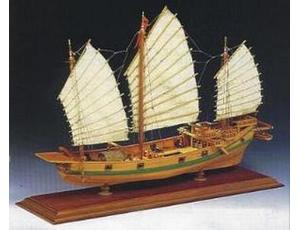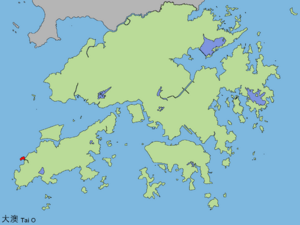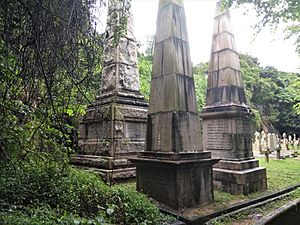Battle of Ty-ho Bay facts for kids
Quick facts for kids Battle of Ty-ho Bay |
|||||||
|---|---|---|---|---|---|---|---|
 A model of an eight gun pirate junk. |
|||||||
|
|||||||
| Belligerents | |||||||
| Chinese Pirates | |||||||
| Commanders and leaders | |||||||
| Unknown | |||||||
| Strength | |||||||
| 1 steamer 1 sloop 1 screw frigate ~6 armed boats sailors and marines |
36 war-junks | ||||||
| Casualties and losses | |||||||
| 9 killed ~6 wounded |
~500 killed or wounded ~1,000 captured 20 war-junks sunk |
||||||
|
|||||||
The Battle of Ty-ho Bay was an important sea fight in 1855. It involved the navies of the United Kingdom and the United States. They fought against Chinese pirates near Tai O, Hong Kong. The main goal was to free merchant ships that the pirates had captured.
This battle was one of the last big fights between Chinese pirate fleets and Western navies. It was also one of the first times British and American forces worked together.
Contents
Why the Battle Happened
Piracy was a big problem in Asia and the Pacific Ocean in the 1800s. Unlike the Atlantic Ocean, where piracy mostly ended by 1830, it was still common in China. Chinese and Japanese pirates often fought each other along China's coast.
By 1855, there were hundreds of pirate hideouts. Western navies had to fight them to protect shipping. In September 1855, pirates led by Kuhlan captured four merchant ships. These ships were being protected by a British paddle steamer called HMS Eaglet.
The British Navy sent the sloop-of-war HMS Rattler to rescue the merchant ships.
Finding the Pirates
HMS Rattler found the pirates in Kuhlan Harbor. But the water was too shallow for the Rattler to attack. So, the Rattler left to get help. It sought aid from the Eaglet and USS Powhatan.
The USS Powhatan was a large steam frigate from the American East India Squadron. It was commanded by Commodore William J. McCluney. The Powhatan later became famous during the American Civil War.
HMS Rattler was led by Commodore William Fellowes. It had 180 officers and crew. The Eaglet was a civilian ship rented by the British Navy. Its crew size and weapons are not known. It was used to tow British ships in shallow waters.
The Battle Begins
On August 4, the steamer Eaglet arrived at Ty-ho Bay. It was towing at least six smaller boats. These boats were full of British and American sailors and marines. Each boat had a small cannon or howitzer.
The British first saw a merchant junk that seemed to be escaping. So, two fast boats, a pinnace from the Rattler and a cutter from the Powhatan, went after it.
Minutes later, the main British and American ships saw the pirate fleet. It included fourteen large pirate ships called junks and twenty-two smaller ones. About 1,500 pirates were on these ships. They were armed with small cannons.
Seven captured merchant ships were also in the bay. Most of these were Chinese junks. When the pirates saw the enemy coming, about half of their junks tried to escape. The other half stayed to fight.
Fighting the Pirates
The pirates started firing heavily at the British and Americans. But most of their shots missed. They flew over the Eaglet and the armed boats. When the expedition got close enough, their boats began to fire back. Six pirate junks were sunk quickly.
As the ships got even closer, the Eaglet let go of the smaller boats. These boats then went to board the pirate junks. Fourteen pirate junks were captured after tough fighting. They were burned soon after.
The seven captured merchant ships were also freed. However, two of them were badly damaged in the battle. They were also burned. In total, fourteen large pirate junks and six smaller ones were destroyed. Sixteen other pirate ships managed to escape.
Aftermath
About 500 pirates were killed, drowned, or wounded during the battle. Around 1,000 pirates were taken prisoner.
The American forces had six wounded and five dead. The British had several wounded and four men killed.
This battle is mostly forgotten today. But a monument was built to remember it. It was first placed in Happy Valley and later moved to Hong Kong Cemetery.
See also
 | William M. Jackson |
 | Juan E. Gilbert |
 | Neil deGrasse Tyson |



